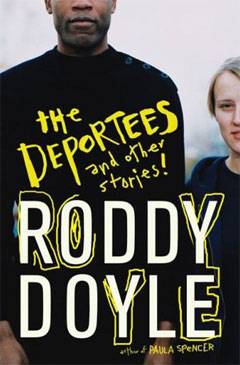 What happens when an ethnically homogenous, economically downtrodden country suddenly is neither anymore? Roddy Doyle’s latest collection of short stories, The Deportees (newly released in paperback) is an inspiring, big-hearted look at an Ireland struggling with its identity.
What happens when an ethnically homogenous, economically downtrodden country suddenly is neither anymore? Roddy Doyle’s latest collection of short stories, The Deportees (newly released in paperback) is an inspiring, big-hearted look at an Ireland struggling with its identity.
Each of the stories holds fast to two gimmicks. First, all of the tales were published serially in a Dublin weekly magazine, so they’re broken up into 800-word chunks. Second, every story features native Irish interacting with immigrants brought to the country by plentiful jobs resulting Ireland’s rapid economic expansion in the last decade. While these constraints might result in a cheesy, melodramatic product in the hands of a lesser writer, Doyle treats them likes disciplines that contribute to the overall work.
Economic prosperity is a new concept to most Irish. As Doyle puts it in the foreword, “It took getting used to. I’d written a novel, The Van, in 1990, about an unemployed plasterer. Five or six years later, ther was no such thing as an unemployed plasterer. A few years on, all the plasterers seemed to be from Eastern Europe.”
The influx of ethnically diverse immigrants arouses equally diverse emotions in more established residents. For instance, in the first story, “Guess Who’s Coming to the Dinner,” awkwardness rules the day when a father, Larry, tries to deal with the thought of his daughter dating a Nigerian immigrant. Larry consoles himself with the thought that he doesn’t judge footballers on the color of their skin: “Paul McGrath, black and brilliant. Gary Breen, white and shite.” But eventually he has to face the fact that he’s more racist than he knew.
Cultural change can also bring opportunity, as we discover in the title story when a would-be impresario (Jimmy Rabbitte, the protagonist of Doyle’s novel-then-movie The Commitments, now older, married and bored) puts together a folk band — The Deportees — with no white Irish allowed. The multi-culti crew learns Woody Guthrie songs, and Rabbitte tries to hold things together.
Later, in “The Pram”, a darker side of these issues steps to the fore. A Polish nanny is mistreated by her boss and has a relationship broken up by the kids she looks after. In retaliation, she concocts a tale so spooky that she ends up freaking herself out, with violent consequences. “The Pram” is tonally inconsistent with the rest of the tales, and it’s definitely the weakest link.
Doyle does a masterful job of creating situations that reveal his characters’ prejudices and insecurities while making sure that they remain sympathetic. It’s a wonderful look at a country, and a people, in transition.








